KU Leuven
KU Leuven[1] is a research university in the Dutch-speaking city of Leuven in Flanders, Belgium. It conducts teaching, research, and services in the natural sciences, engineering, humanities, medicine, law, business, and social sciences.[2]
Katholieke Universiteit Leuven | |
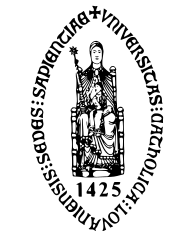 | |
| Latin: Universitas catholica Lovaniensis | |
Other name | Katholieke Universiteit te Leuven |
|---|---|
| Motto | Sedes Sapientiae (Latin) |
Motto in English | Seat of Wisdom |
| Type | Independent/Free catholic university |
| Established | 1834/35 (Catholic University of Leuven)C 1970 (split of the bilingual university into KUL and UCL) |
| Endowment | €950 million |
| Chairman | Herman, Baron Daems |
| Chancellor | Jozef De Kesel |
| Rector | Luc Sels |
Administrative staff | 11,534 |
| Students | 58,045 (2017–18) |
| 4,272 | |
| Location | , 50.878°N 4.700°E |
| Campus | Main (urban/university town) campus in Leuven and satellite campuses in Aalst, Antwerp, Bruges, Brussels, Diepenbeek, Geel, Ghent, Kortrijk, Ostend and Sint-Katelijne-Waver |
| Colors | Blue and white |
| Affiliations | CLUSTER Coimbra Group EUA, LERU CESAER EQUIS EASN VIU |
| Mascot | Fons Sapientiae |
| Website | www.kuleuven.be |
 | |
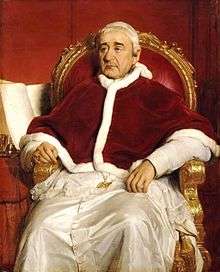
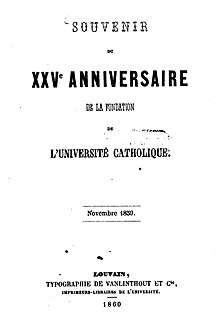
The university's full name is Katholieke Universiteit Leuven, officially Katholieke Universiteit te Leuven,A which translates in English as Catholic University of Leuven.B It is however not translated in official communications, like its similarly-named French-language sister university Université catholique de Louvain (UCLouvain).
In addition to its main campus in Leuven, it has satellite campuses in Kortrijk, Antwerp, Ghent, Bruges, Ostend, Geel, Diepenbeek, Aalst, Sint-Katelijne-Waver, and in Belgium's capital Brussels.[3] KU Leuven is the largest university in Belgium and the Low Countries. In 2017–18, more than 58,000 students were enrolled. Its primary language of instruction is Dutch, although several programs are taught in English, particularly graduate degrees.[4][5]
KU Leuven consistently ranks among the top 100 universities in the world by major ranking tables. As of 2020, it ranks 45th in the Times Higher Education rankings, 80th according QS World University Rankings, 85th according to the Shanghai Academic Ranking of World Universities,[6][7][8] For four consecutive years starting in 2016, Thomson Reuters ranked KU Leuven as Europe's most innovative university,[9] with its researchers having filed more patents than any other university in Europe; its patents are also the most cited by external academics.
Although Catholic in heritage, KU Leuven operates independently from the Church.[10] Due to its historic roots to the old University of Leuven, it is considered the oldest extant Catholic university. KU Leuven is open to students from different faiths or life-stances.[11][12]
History
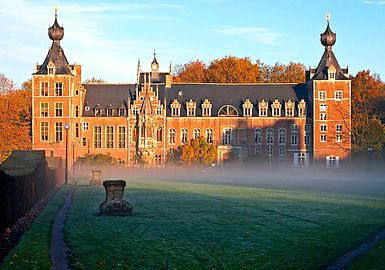
The old University of Leuven, founded in 1425, was formally integrated into the French Republic. A law dating to 1793 mandated that all universities in France be closed came into effect.[13] The old University of Leuven was abolished by decree of the Département of the Dyle on October 25, 1797.[14].
In 1817 was founded in Louvain the State university of Leuven where many professors from the old University of Louvain have taught. This university was also abolished in 1835.
The Catholic University of Leuven was founded[15] in 1834 in Mechlin. This new Catholic university stayed only briefly in Mechelen, as the bishops already moved the university headquarters to Leuven on 1 December 1835, where it took the name Catholic University of Leuven, after the suppression of the State university of Leuven in 1835, where many professors from the old University of Louvain have taught, and is now frequently (but controversially) identified as a continuation of the older institution.C
In 1968, tensions between the Flemish-speaking and French-speaking communities led to the splitting of the bilingual Catholic University of Leuven into two "sister" universities, with the Flemish-language university becoming a fully functioning independent institution in Leuven in 1970, and the Université catholique de Louvain departing to a newly built greenfield campus site in the French-speaking part of Belgium. KU Leuven's first rector was Pieter De Somer. KU Leuven considers itself to be the continuation of the Studium Generale Lovaniense established in 1425.[16]
In 1972, the KUL set up a separate entity Leuven Research & Development (LRD) to support industrial and commercial applications of university research. It has led to numerous spin-offs, such as the technology company Metris, and manages tens of millions of euros in investments and venture capital.
The university's electronic learning environment, TOLEDO, which started in September 2001, was gradually developed into the central electronic learning environment at the KUL. The word is an acronym for TOetsen en LEren Doeltreffend Ondersteunen (English: "effectively supporting testing and learning"). It is the collective name for a number of commercial software programs and tools, such as Blackboard. The project offers the Question Mark Perception assignment software to all institution members and has implemented the Ariadne KPS to reuse digital learning objects inside the Blackboard environment.
On 11 July 2002, the KU Leuven became the dominant institution in the "KU Leuven Association" (see below).
KU Leuven is a member of the Coimbra Group (a network of leading European universities) as well as of the LERU Group (League of European Research Universities). Since November 2014, KU Leuven's Faculty of Economics and Business is accredited by European Quality Improvement System, which is a leading accreditation system specializing in higher education institutions of management and business administration.[17] As of academic year of 2012–2013, the university held Erasmus contracts with 434 European establishments. It also had 22 central bilateral agreements in 8 countries: the United States, China, South Africa, Japan, the Democratic Republic of Congo, Vietnam, Poland, and the Netherlands. The vast majority of international EU students came from the Netherlands, while most non-EU ones come from China.
KU Leuven is financially independent from the Catholic Church. Although a representative from the Church sits in its Board of Governors, their function is observational and has no voting power. Its management and academic decisions are similarly autonomous.[10]
In December 2011, the university changed its official name to KU Leuven in all official communications and branding.[18][19] While its legal name remains to be Katholieke Universiteit Leuven, the university uses KU Leuven in all communications, including academic research publications.[1] The long name is only used in contracts and only on the first instance, according to university's communication guidelines. According to its then rector, the change is intended as a way to emphasize its history of freedom of academic inquiry and its independence from the Church, without erasure of its Catholic heritage.[18]
Since August 2017, the university has been led by Luc Sels who replaced former rector Rik Torfs. The Belgian archbishop, André-Joseph Léonard is the current Grand Chancellor and a member of the university board.
KU Leuven hosts the world's largest banana genebank, the Bioversity International Musa Germplasm Transit Centre, that celebrated its 30th anniversary in 2017 and was visited by Deputy Prime Minister and Minister for Development Cooperation, Alexander De Croo.[20]
Historically, the Catholic University of Leuven has been a major contributor to the development of Catholic theology. The university is dedicated to Mary, the mother of Jesus, under her traditional attribute as "Seat of Wisdom", and organizes an annual celebration on 2 February in her honour. On that day, the university also awards its honorary doctorates. The seal used by the university shows the medieval statue Our Lady of Leuven in a vesica piscis shape.
Campus
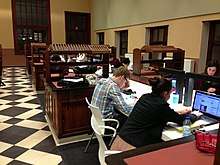
KU Leuven's main campus is in Leuven where school faculties, libraries, institutes, residence halls, the university hospital UZ Leuven, and other facilities are interspersed throughout the city proper, as well as just outside its ring road in Heverlee borough.[21] Its intercultural meeting center Pangaea is located in the city center. The University Sports Centre is located in Heverlee, including Univ-Fit gym. In addition, the UNESCO World Heritage Site Groot Begijnhof, a historic beguinage in the south of city, is owned by the university and functions as one of its many residence halls.
Public transport within the city is primarily served by the De Lijn bus system. Leuven is a main hub in Belgium's and nearby country's train network. Leuven station is located in the northeast edge of the city.
KU Leuven has campuses in Kortrijk, Antwerp, Ghent, Bruges, Ostend, Geel, Diepenbeek, Aalst, Sint-Katelijne-Waver, Brussels.
Organization and academics
Academics at KU Leuven is organized into three groups, each with its own faculties, departments, and schools offering programs up to doctoral level. While most courses are taught in Flemish, many are offered in English, particularly the graduate programs.[22] Notable divisions of the university include the Higher Institute of Philosophy and the Rega Institute for Medical Research.
The students of the university are gathered together in the student's council Studentenraad KU Leuven.[23] They have representatives in most meetings at the university, including the Board of Directors. It was separated from LOKO in 2012-2013 when the different locations outside of Leuven became part of the university. LOKO remained the overarching student organisation for all students in the city of Leuven.
Biomedical Sciences Group
- Faculty of Medicine
- Faculty of Pharmaceutical Sciences
- Faculty of Kinesiology and Rehabilitation Sciences
- Department of Cardiovascular Sciences
- Department of Oral Health Sciences
- Department of Pharmaceutical and Pharmacological Sciences
- Department of Human Genetics
- Department of Imaging and Pathology
- Department of Kinesiology
- Department of Microbiology and Immunology
- Department of Cellular and Molecular Medicine
- Department of Neurosciences
- Department of Oncology
- Department of Clinical and Experimental Medicine
- Department of Rehabilitation Sciences
- Department of Development and Regeneration
- Department of Public Health and Primary Care
- Doctoral School of Biomedical Sciences
Humanities and Social Sciences Group
- Institute of Philosophy
- Faculty of Theology and Religious Studies
- Faculty of Canon Law
- Faculty of Law
- Faculty of Economics and Business
- Faculty of Social Sciences
- Faculty of Arts
- Faculty of Psychology and Educational Sciences
- Documentation and Research Center for Religion, Culture, and Society (KADOC)
- Leuven Language Institute
- Doctoral School for the Humanities and Social Sciences
Science, Engineering and Technology Group
- Faculty of Architecture
- Faculty of Science
- Faculty of Engineering Science
- Faculty of Bioscience Engineering
- Faculty of Engineering Technology
- Department of Earth and Environmental Sciences
- Department of Architecture
- Department of Biology
- Department of Biosystems
- Department of Civil Engineering
- Department of Chemistry
- Department of Chemical Engineering
- Department of Computer Science
- Department of Electrical Engineering (ESAT)
- Department of Materials Engineering
- Department of Microbial and Molecular Systems
- Department of Physics and Astronomy
- Department of Mechanical Engineering
- Department of Mathematics
- Center for Science, Technology, and Ethics (CWTE)
- Arenberg Doctoral School of Science, Engineering, and Technology
Science, Engineering and Technology Group
- European Centre for Ethics
- HIVA - Research Institute for Work and Society
- Interfaculty Centre for Agrarian History
- University Statistics Centre (UCS)
- KU Leuven University Energy Institute
- LUCAS - Centre for Care Research and Consultancy
Libraries
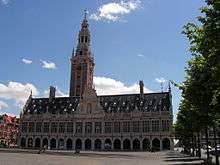
KU Leuven has 24 libraries and learning centers across its 12 campuses, containing millions of books and other media. Its theology library alone hold 1.3 million volumes, including works dating from the 15th century.[24] The following libraries are found at its Leuven campus:[25]
- 2Bergen - Biomedical Library
- 2Bergen - Campuslibrary Arenberg (exact sciences, engineering sciences, industrial engineering sciences, bio-engineering sciences, architecture and kinesiology and rehabilitation sciences)
- Artes - Ladeuze & Erasmushuis (Humanities & Social Sciences Group and the Faculty of Arts)
- Library of Psychology and Educational Sciences
- Law Library
- Library of Social Sciences
- Library of the Institute of Philosophy
- AGORA Learning Centre
- EBIB Learning Centre
- MATRIX (music and audio recordings library)
- Maurits Sabbe Library (Library of the Faculty of Theology and Religious Studies)
University hospital
Universitair ziekenhuis Leuven (UZ Leuven) is the teaching hospital associated with the KU Leuven. Its most well known and largest campus is Gasthuisberg, which also houses the faculty of pharmaceutical sciences and most of the faculty of medicine.
Affiliations

Since July 2002, thirteen higher education institutes have formed the KU Leuven Association. Members include:[26]
- KU Leuven
- LUCA School of Arts
- Odisee
- Thomas More
- UC Leuven Limburg
- Vives
KU Leuven is a member of a number of international university affiliations including the League of European Research Universities, Coimbra Group, UNA Europa, Universitas 21, and Venice International University, among others.
The university is a member of the Flanders Interuniversity Institute of Biotechnology. The Interuniversity Microelectronics Centre is a spin-off company of the university.
Rankings
| University rankings | |
|---|---|
| Global – Overall | |
| ARWU World[7] | 85 (2019) |
| CWTS World[27] | 52 (2019) |
| THE World[28] | 45 (2020) |
| USNWR Global[29] | 56 (2020) |
| QS World[8] | 80 (2020) |
As of 2020, KU Leuven ranks 45th in the Times Higher Education rankings, 80th according QS World University Rankings, 85th according to the Shanghai Academic Ranking of World Universities.[6][7][8] KU Leuven ranked first in Thomson Reuters' list of Europe's most innovative universities four times in a row since it began in 2016.[30] As of 2019, also ranks 52nd according to the CWTS Leiden Ranking and 56th according U.S. News & World Report Best Colleges Ranking. [5][31]
According to QS World University Rankings by Subject in 2019, KU Leuven ranked within the world's top 50 universities in the following fields: Sports-related Subjects (11), Theology (14), Dentistry (17), Classics and Ancient History (22), Library and Information Management (23), Psychology (24), Statistics and Operational Research (26), Mechanical Engineering (30), Philosophy (31), Geography (34), Pharmacy & Pharmacology (35), Education and Training (36), Law (37), Social Policy and Administration (39), Development Studies (43), Materials sciences (45), Chemical Engineering (46), Politics (49), Sociology (50), Life Sciences and Medicine (56), Social Sciences and Management (60), Arts and Humanities (61), Engineering and Technology (61). Also according to QS, many other KU Leuven programs rank within the top 100 in the world, including Linguistics, English Language and Literature, History, Anatomy and Physiology, Architecture, Anthropology, Computer Science and Information System, Biological Sciences, Civil and Structural Engineering, Electrical and Electronic Engineering, Business and Management Studies, Mathematics, Economics and Econometrics, Chemistry, Accounting and Finance .[32]
| Year | World university ranking | European university ranking | World reputation ranking |
|---|---|---|---|
| 2011 | 119 (THE) | 37 (THE) | |
| 2012 | 67 (THE | 17 (THE | 81-90 (THE) |
| 2013 | 58 (THE | 13 (THE | 81-90 (THE |
| 2014 | 61 (THE | 17 (THE | 71-80 (THE |
| 2015 | 55 (THE | 13 (THE | 71-80 (THE |
| 2016 | 35 (THE | 12 (THE | 51-60 (THE |
| 2017 | 40 (THE | 12 (THE | 51-60 (THE |
| 2018 | 47 (THE | 14 (THE | 71-80 (THE |
| 2019 | 48 (THE |
15 (THE |
51-60 (THE |
Rectors
| # | Name | Began office | Ended office | Studies | Vice-rector |
|---|---|---|---|---|---|
| 1 | Pieter De Somer | 1968 | 1985 | Medicine | |
| 2 | Roger Dillemans | 1985 | 1995 | Law | |
| 3 | André Oosterlinck | 1995 | 2005 | Engineering | |
| 4 | Marc Vervenne | 2005 | 2009 | Theology | Mark Waer |
| 5 | Mark Waer | 2009 | 2013 | Medicine | |
| 6 | Rik Torfs | 2013 | 2017 | Canon Law | |
| 7 | Luc Sels (nl) | 2017 | Economics |
Notable alumni
- For pre-1970 alumni see Catholic University of Leuven (1834–1968)#Notable alumni
- Leon Bekaert (b. 1958), economics, businessman
- Paul Bulcke (b. 1954), economics, businessman, CEO of Nestlé
- Jan Callewaert, economics, founder of Option N.V.
- Mathew Chandrankunnel (b. 1958), professor of philosophy of science at Dharmaram Vidya Kshetram
- Mathias Cormann (b. 1970), Belgian-born Australian Senator and Minister for Finance
- Jo Cornu, engineer, previous CEO of the National Railway Company of Belgium
- Joan Daemen (b. 1965), cryptographer, one of the designers of Advanced Encryption Standard (AES).
- Julien De Wilde (b. 1967), civil engineer, businessman
- Noël Devisch (b. 1943), agriculture
- Gabriel Fehervari (b. 1970) law, businessman
- Willy Geysen, law, head of the Centre for Intellectual Property Rights (CIR)
- Dr. A. Q. Khan (b. 1936), Founder of Pakistan's Nuclear Program
- Koen Lamberts (b. 1964), President and Vice-Chancellor, University of Sheffield (United Kingdom)
- Georges Meekers (b. 1965), Belgian-born wine writer and educator
- Simon Mignolet (b. 1988), goalkeeper
- Martin Moors, philosopher
- Rudi Pauwels (b. 1960), pharmacologist, co-founder of Tibotec and Virco
- Vincent Rijmen (b. 1970), cryptographer, one of the designers of Advanced Encryption Standard (AES).
- Guðmundur Steingrímsson (b. 1972), Icelandic politician
- Francine Swiggers, economics, businesswoman
- Wu Rong-i, economics, former Vice Premier of Taiwan, Taiwanese politician
- Marc Van Ranst (b. 1965), physician, virologist
- Herman Van Rompuy (b. 1947), Belgian statesman, appointed President of the European Council in November 2009
- Jef Valkeniers, doctor and politician
- Frans Vanistendael, law
- Catherine Verfaillie (b. 1957) physician, stem cell scientist
- Koen Vervaeke (b. 1959), history, diplomat
- Assisi Saldanha, C.Ss.R., Catholic Priest, Indian Biblical Scholar
Honorary doctorates
Notable recipients of honorary doctorates at the Katholieke Universiteit Leuven include:
- Baudouin of Belgium (1951), King of the Belgians
- Albert II of Belgium (1961), King of the Belgians
- Timothy Garton Ash (2011), British historian and Professor of European Studies, University of Oxford
- Michelle Bachelet (2015), President of Chile
- Abhijit Banerjee (2014), Indian economist, Massachusetts Institute of Technology
- Patriarch Bartholomew I of Constantinople (1996)
- Roberto Benigni (2007), Italian actor, comedian, screenwriter and director of film, theatre and television.
- John Braithwaite (2008), Australian criminologist (application of the idea of restorative justice to business regulation and peacebuilding
- Manuel Castells (2004), Professor of Sociology, Open University of Catalonia, University of Southern California
- Leon O. Chua (2013), professor in the electrical engineering and computer sciences department at the University of California, Berkeley
- Carla Del Ponte (2002), former Chief prosecutor of two United Nations international criminal law tribunals
- Jared Diamond (2008), professor of Geography and Physiology, UCLA
- Jacques Derrida (1989), French philosopher
- John Kenneth Galbraith (1972), Canadian economist
- Nadine Gordimer (1980), South African author, Booker Prize 1974, Nobel Prize in Literature 1991
- Alan Greenspan (1997), economist, former chairman of the Board of Governors of the US Federal Reserve
- Eugène Ionesco (1977), Romanian and French playwright
- Ban Ki-moon (2015), Secretary-General of the United Nations
- Helmut Kohl (1996), former Chancellor of Germany
- Christine Lagarde (2012), Managing Director of the International Monetary Fund (IMF)
- Mario Vargas Llosa (2003), Peruvian writer
- Michael Marmot (2014), British epidemiologist, University College London
- Martha Nussbaum (1997), American philosopher, University of Chicago
- Dirk Obbink, Lecturer in Papyrology and Greek Literature at Oxford University and the head of the Oxyrhynchus Papyri Project.
- Roger Penrose (2005), professor in Mathematical Physics, University of Oxford
- Navi Pillay (2012), United Nations High Commissioner for Human Rights
- Thomas S. Popkewitz (2004), professor of curriculum theory, University of Wisconsin-Madison School of Education
- Mary Robinson (2000), former President of Ireland
- Jacques Rogge (2012), President of the International Olympic Committee (IOC)
- Oscar Arnulfo Romero (1980), archbishop of San Salvador (El Salvador), human rights activist
- Helmut Schmidt (1983), former Chancellor of Germany
- Nate Silver (2013), American author and statistician
- Fiona Stanley (2014), Australian epidemiologist
- Rowan Williams (2011), Archbishop of Canterbury
- Angela Merkel (2017),[33] German politician, Chancellor of Germany
- James P. Allison (2017), Immunologist, Nobel Prize in Physiology or Medicine 2018
Bibliography
- 1860 : Souvenir du XXVe anniversaire de la fondation de l'Université catholique: Novembre 1859, Louvain, typographie Vanlinthout et Cie, 1860 Souvenir du XXVe anniversaire de la fondation de l'Université catholique: Novembre 1859.
See also
Footnotes
- A.^ Dutch pronunciation: [katoˈlikə ʔynivɛrsiˈtɛit ˈløːvə(n)],

- B.^ According to the university's style guidelines, KU Leuven is the only official name in all languages. (in Dutch) However, according to the university's statutes, KU Leuven is an abbreviation of Katholieke Universiteit te Leuven, which is the university's legal name by the law of 28 May 1970 issuing legal personality to the institution, in the university's own official publications, with a variant Katholieke Universiteit Leuven according to the Flemish Community of Belgium.
- C.^ The Old University of Leuven (1425–1797) is the oldest university in the low countries, and the Catholic University of Leuven (1834) is generally, yet controversially, identified as a continuation of it. In the mid-1800s, Belgium's highest court, the Court of Cassation, ruled that the 1834 "Catholic University of Leuven" was a different institution created under a different charter and thus cannot be regarded as continuing the 1425 "University of Leuven".[34] See also: History of the Old University of Leuven.
References
- "Basic info legal entity KU Leuven". admin.kuleuven.be. Retrieved 2020-04-30.
- "About KU Leuven". www.kuleuven.be. Retrieved 2018-04-26.
- "Studeren aan de KU Leuven, ook buiten Leuven – KU Leuven". Kuleuven.be. Retrieved 2015-10-18.
- "International programmes". Kuleuven.be. Retrieved 2014-03-28.
- https://www.usnews.com/education/best-global-universities/catholic-university-of-leuven-504785
- "World University Rankings". Times Higher Education (THE). 2019-08-20. Retrieved 2020-05-09.
- "Academic Ranking of World Universities – KU Leuven". www.shanghairanking.com. 12 January 2020.
- "QS World University Rankings – KU Leuven". 12 January 2020.
- "Reuters Top 100". Reuters. Retrieved 2019-07-11.
- Bellefroid, Fred. "OECD Quality Assessment – Fostering Quality at the Katholieke Universiteit Leuven" (PDF). OECD.
- "Religion and Philosophical Diversity at KU Leuven". www.kuleuven.be. Retrieved 2020-05-08.
- "Religion in Leuven". www.kuleuven.be. Retrieved 2020-05-08.
- The law of 15 September 1793 had decreed the suppression of all the colleges and universities in France, but the universities remain de facto until the new law of 7 ventôse year III (25 February 1795) creating the Écoles centrales. In accordance with this law the University of Louvain was abolished by Decree of the Departement of the Dijle. Louis Trénard, De Douai à Lille, une université et son histoire, Presses Universitaires du Septentrion, 1978, p.37 note 6.
- Jan Roegiers et al., Leuven University, Leuven, Leuven University Press, 1990, p. 31: "With the Law of 3 Brumaire of Year IV, which reorganized higher education in the French Republic, there was no place for the University of Louvain, and it was abolished by Decree of the Departement of the Dijle on 25 october (1797)".
- Souvenir du XXVe anniversaire de la fondation de l'Université catholique : Novembre 1859, Louvain, typographie Vanlinthout et Cie, 1860 : "Inaugurée à Malines, le 4 novembre 1834, l'Université catholique a célébré à Louvain, le jeudi 3 novembre 1859, sa vingt-cinquième année d'existence"Souvenir du XXVe anniversaire de la fondation de l'Université catholique: Novembre 1859.
- https://www.kuleuven.be/english/about-kuleuven/history
- "EFMD EQUIS Accreditation for KU Leuven's Faculty of Economics and Business".
- "KU Leuven drops "Catholic" from its name | Flanders Today". www.flanderstoday.eu. Retrieved 2020-04-30.
- News, Flanders (2011-12-26). "Leuven University changes its name". vrtnws.be. Retrieved 2020-04-30.
- "Belgian support for innovative agricultural research".
- "Student Services Leuven". www.kuleuven.be. Retrieved 2020-05-09.
- "Faculties, departments and schools". www.kuleuven.be. Retrieved 2020-05-09.
- "Studentenraad KU Leuven". Retrieved 14 July 2018.
- "... that our library has more than 1.3 million volumes?". Retrieved 2017-05-08.
- "KU Leuven libraries". bib.kuleuven.be. Retrieved 2017-05-08.
- Members KU Leuven Association. Retrieved June 24, 2018.
- "CWTS Leiden Ranking 2019". 23 September 2019.
- "World University Rankings - KU Leuven". 12 January 2020.
- "U.S. News Education: Best Global Universities - Catholic University of Leuven". 12 January 2020.
- Ewalt, David. "Europe's 100 Most Innovative Universities".
- Studies (CWTS), Centre for Science and Technology. "CWTS Leiden Ranking". CWTS Leiden Ranking. Retrieved 2020-05-09.
- "QS World University Rankings by Subject 2019". Top Universities. Retrieved 2017-05-11.
- "KU Leuven and UGent to confer joint honorary doctorate on Angela Merkel".
- Ruling of the Cour de Cassation of Belgium of 26 November 1846: "The Catholic University of Leuven can not be regarded as continuing the old University of Leuven", in, Table générale alphabétique et chronologique de la Pasicrisie Belge contenant la jurisprudence du Royaume de 1814 à 1850, Brussels, 1855, p. 585, column 1, alinea 2. See also: Bulletin Usuel des Lois et Arrêtés, 1861, p. 166.
External links
| Wikimedia Commons has media related to Katholieke Universiteit Leuven. |